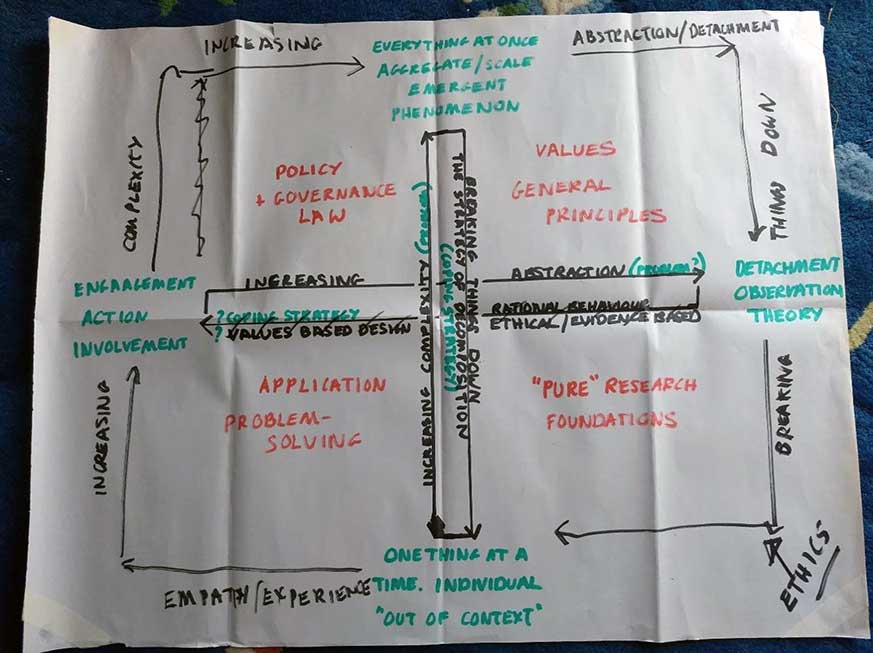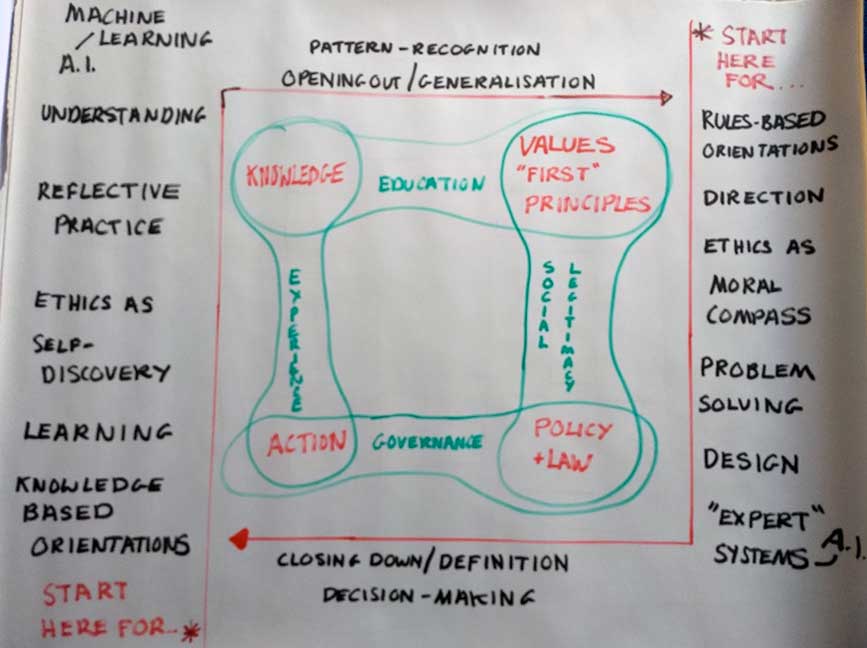In this blog, Dr. Jenny Bunn offers her reflections and thoughts following the Digital Ethics Forum meetup.
Jenny Bunn leads on the Department of Information Studies’ digital curation teaching. She is the current Chair of the Archives and Records Association Section for Archives and Technology and is currently organising a workshop on Human-centred Explainable Artificial Intelligence. Further information on this work is available at https://blogs.ucl.ac.uk/hexai/. Dr Bunn can be found at j.bunn@ucl.ac.uk
Thank you for organising the Digital Ethics Forum yesterday. It was exciting to meet so many new people. As you will remember I brought a sketch along [first picture] that had my initial thoughts before attending.
After further reflection following the event, I think that what I was trying to do was to form an understanding of how I (as an information studies practitioner) fitted into that room (which as was acknowledged was heavily weighted to the engineering sciences) in terms of both;
- Why I felt I was different and hence what sort of distinctiveness I could bring to the group,
- What the common ground looked like and what it was that we all shared an interest in.
I have subsequently re-drawn my thinking (second picture), and it is now a bit clearer. There are two parts to the picture.
In the middle, there is an initial mapping of the common ground, what we are interested in and how the different parts of that might relate. The map is drawn from my perspective, but it might be helpful for others as something to work with. They could try to place the things they are interested in onto it and if they don’t fit, or if there is nowhere to put them, expand and change it. For example, I was wondering if the framework that Zeynep Engin, of Data – Algorithms – Interactions, might be similar in some way to my framework of First Principles (or perhaps Foundations) – Policy and Law (or Rules) and Action?


Around the outside, two alternative orientations arise from starting in different places. I have attached some labels to these different orientations to try to draw out the difference between them. Again, the purpose of the diagram is to make people consider where they fit – do they tend to take one orientation above the other or not? In what way might their orientation lead to blind spots and what might those blind spots be? It did strike me that the way the conversations went yesterday, they did lean towards the rules-based orientation, with only a few glimpses of a more knowledge-based one (perhaps when Hannah Knox from Anthropology raised the question of how digital technologies affected what it means to be human). I also thought that the disciplines that were also professions (e.g. Laws, Medicine and perhaps my own of Archives and Records Management) had both closed and opened up a feedback loop between the orientations in a different way – it was in/through this feedback loop that their form as professions emerged.
I hope that is helpful. I also gave some thought to your questions about distinctive UCL strengths, value gain and next steps. What makes UCL distinctive is the uniqueness and distinctiveness of the individuals who constitute it. If value gain comes from the whole being more than the sum of its parts, do you want the whole that the Forum forms to be a network or a community? If a network, perhaps continues to map the network as you are doing and provide more opportunities to get to know the wider network (find out what others are doing and what their interests are). If a community, give us something to hold in common. Teaching and curriculum design is a boundary object across our community. Why not get all those who think they already are or who are thinking about ‘teaching’ digital ethics into the same room and make them create a joint curriculum for a Masters in Digital Ethics. There needs to be no expectation that this will happen. However, in being forced to realise it even on paper, we will also be forced to realise (in common rather than individually) what Digital Ethics might be and consist of, and to negotiate (actively) our differences in perspective on it.

